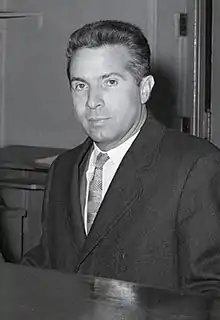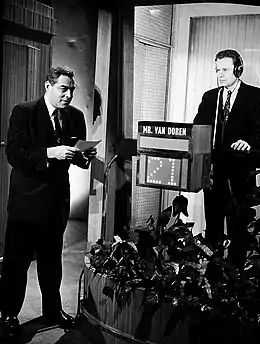Albert Freedman | |
|---|---|
 | |
| Born | March 27, 1922 Taunton, Massachusetts, U.S. |
| Died | April 11, 2017 (aged 95) Greenbrae, California, U.S. |
| Occupation | Game show producer |
| Known for | 1950s quiz show scandals |
| Spouses |
|
| Children |
|
Albert Freedman (March 27, 1922 – April 11, 2017) was an American television producer who was involved with the 1950s quiz show scandals. He became a central figure in the cheating scandals and was the first person indicted. He was arrested for perjury after lying about giving contestants questions, and then recanted his grand jury testimony which led to the arrests of 14 former contestants. After the quiz show investigations concluded, Freedman moved to London to work in pornography publications.
Early life
He was born on March 27, 1922, in Taunton, Massachusetts. During World War II he enlisted in the U.S. Marines and was sent to the Pacific Theater. After the war Freedman went to study at Boston College, and later at the University of Southern California. He also studied in Paris at a film school.[1] He was married to Esther Katz and had four children with her.[2]
Career

In the 1950s television was just becoming popular, and Freedman moved to New York and got a job with a Groucho Marx show called You Bet Your Life before becoming a television producer.[2] He produced a show called Tic-Tac-Dough and The Big Surprise. Quiz shows also gained popularity: CBS started a show called The $64,000 Question and it was immediately very popular. Dan Enright started a show called Twenty-One to compete,[2] it was produced by Entertainment Productions Inc.[3] Freedman took over producing Twenty-One in 1956. At the time, the show Twenty-One had a contestant named Herb Stempel who seemed unstoppable. The continuing success of Stempel caused the show's ratings to fall. In response, Geritol (the show's sponsor) sought a new contestant to rival Stempel.[2]
Scandal
In 1956 Freedman found a teacher from Columbia University named Charles Van Doren who he thought could be a rival to Stempel. He planned to do this by helping Van Doren cheat. In a 2008 New Yorker Magazine article Van Doren stated that Freedman told him, "I've thought about it, Charlie, and I've decided you should be the person to beat Stempel. And I'll help you do it." In speaking to the Archive of American Television in 2000, Freedman would only admit that he told Van Doren what to study prior to the shows. Van Doren debuted on the show November 28, 1956.[1][2]
_and_Steven_B._Derounian_quiz_show_scandals.jpg.webp)
in 1958 another contestant on Twenty-One (Elfrida von Nardroff) went on to have a long run on the show and earned $220,500 in winnings. Shortly after her appearance on the show, an investigation into quiz shows was begun by Manhattan District Attorney, Frank Hogan.[4] The investigation was prompted by a standby contestant who had hoped to be on the television show Dotto. The contestant complained to the New York District Attorney's office about irregularities.[5]
The Manhattan district attorney's investigation discovered that Twenty-One had been paying some contestants to lose. The trouble began when a losing contestant did not receive compensation that was promised to him. The man went to the media and revealed the game show's scheme.[6] A grand jury was convened on September 17, 1958, to look into allegations which were made regarding quiz shows. The Grand Jury heard from more than 200 witnesses over a nine-month period.[7][8] On November 7, 1958, Freedman became the first person indicted and arrested in the quiz show scandal.[5][9] He became the central figure in the quiz show scandals.[1] When Freedman was previously before the grand jury he had denied that he supplied contestants with answers, and when he was led out of court after his testimony he stated, "Everything I told the grand jury is the truth."[10] Van Doren stated that Freedman tried to extort $5000 from him as payment for Freedman helping him win: a charge which Freedman denied.[3]
In September 1959 Freedman admitted he had lied to the grand jury and he was indicted for perjury.[11] He was arrested and then recanted his testimony to the grand jury in order to avoid a conviction.[1] He was facing two counts of perjury and 10 years in prison.[10] Faced with the prospect of prison, he finally admitted that he had given contestants answers.[12] On October 7, 1959, he testified before the House Subcommittee on Legislative Oversight and admitted that he assisted contestants on the show "21" about 50% of the time.[13] In 1962, von Nardroff pleaded guilty to second-degree perjury and Van Doren pleaded guilty to perjury.[14][1] Twelve other former contestants were also arrested in the scandal.[4]
Later life
Freedman relocated in London and worked for Penthouse and other pornography publications.[12] In 1981 Freedman went on to earn a Ph.D. from the Institute for the Advanced Study of Human Sexuality.[1] He later remarried to his second wife, Nancy Blumberg, and took on her two children as stepchildren. Freedman died of heart failure on April 11, 2017.[2] At the time of his death he lived in Greenbrae, California.[2]
Popular culture
In 1994, the film Quiz Show was released and it depicted the events of the 1950s quiz show scandal. It was directed and produced by Robert Redford and Albert Freedman was portrayed by Hank Azaria.[15] Freedman said he did not enjoy the movie, because it made it seem as if there was more cheating than there actually was on "Twenty-One".[2]
References
- 1 2 3 4 5 6 Barnes, Nick (April 20, 2017). "Albert Freedman, Central Figure in the Quiz Show Scandals of the 1950s, Dies at 95". The Hollywood Reporter. Archived from the original on January 12, 2022. Retrieved January 12, 2022.
- 1 2 3 4 5 6 7 8 Sandomir, Richard (March 22, 2017). "Albert Freedman, Producer of Rigged 1950s Quiz Show, Dies at 95". The New York Times. Archived from the original on January 12, 2022. Retrieved January 12, 2022.
- 1 2 "Casts Doubt on a Hoax Denial". Kansas City Star. November 4, 1959. Archived from the original on January 13, 2022. Retrieved January 13, 2022.
- 1 2 Sandomir, Richard (December 15, 2021). "Elfrida von Nardroff, 96, Dies; Won Big Money on a Fixed Quiz Show". The New York Times. Archived from the original on December 28, 2021. Retrieved January 12, 2022.
- 1 2 "Producer of Quiz Show 21 is Indicted on Charges of Lying". Madison Wisconsin State Journal. November 8, 1958. Archived from the original on January 13, 2022. Retrieved January 13, 2022.
- ↑ Kinsler, Mark (August 16, 2021). "Remember When: The quiz show scandal". Lancaster Eagle Gazette. Archived from the original on January 12, 2022. Retrieved January 12, 2022.
- ↑ Investigation of Television Quiz Shows. Hearings Before a Subcommittee of the Committee on Interstate and Foreign Commerce, House of Representatives, Eighty-sixth Congress, First Session. Washington D.C.: United States Government Printing Office. 1960. p. 7. ISBN 978-1342034953. Retrieved June 7, 2022.
- ↑ Matthews, Melvin E. (2019). Loss of innocence : America's scandals in the post-war years. New York: Algora Publishing. pp. 119–120. ISBN 978-1628943504. Retrieved January 12, 2022.
- ↑ "Producer of Quiz Show 21 is Arrested". Fergus Falls Daily Journal. November 7, 1958. Archived from the original on January 13, 2022. Retrieved January 13, 2022.
- 1 2 "Producer of Quiz Show is Indicted". York Daily Record. November 8, 1958. Archived from the original on January 13, 2022. Retrieved January 13, 2022.
- ↑ Federal Communications Commission Reports. Washington D.C.: United States Government Printing Office. 1964. p. 759. Retrieved January 12, 2022.
- 1 2 "Obituary: Albert Freedman died on April 11th". Economist. May 6, 2017. Archived from the original on January 12, 2022. Retrieved January 12, 2022.
- ↑ Samuel, Lawrence R. (2001). Brought to you by : postwar television advertising and the American dream (1st ed.). Austin: University of Texas Press. p. 9. ISBN 978-0292777637. Retrieved June 5, 2022.
- ↑ Clarkthe, Alfred E. (January 18, 1962). "Van Doren Pleads Guilty; Is Freed; VAN DOREN AND 9 FREED BY COURT Justice Notes Humiliation Defendents Nervous Perjury Sentences Are Suspended". New York Times. Retrieved June 5, 2022.
- ↑ David Ansen (September 18, 1994). "When America Lost Its Innocence--Maybe". Newsweek. Archived from the original on January 30, 2022.